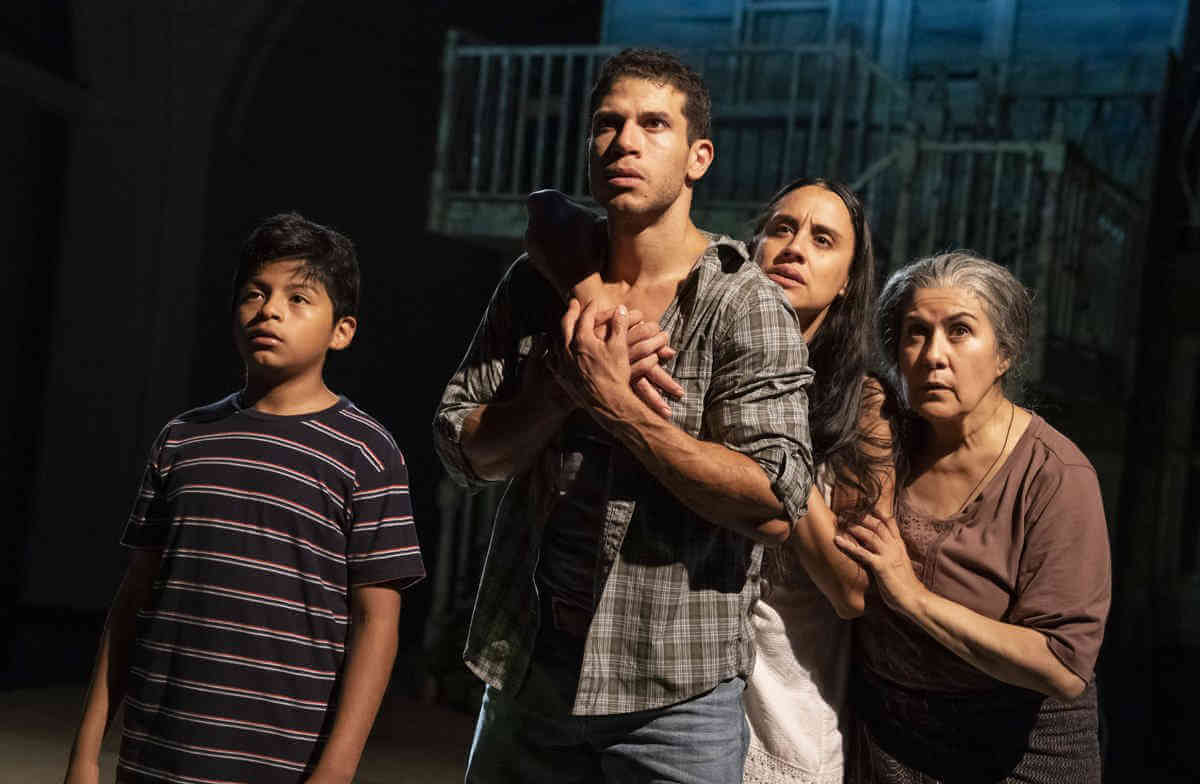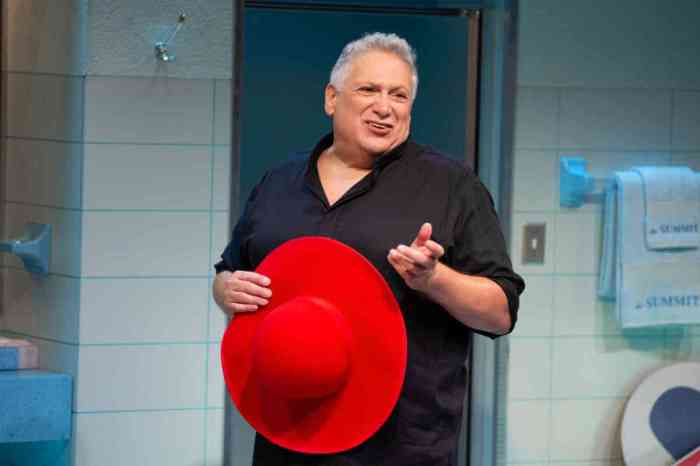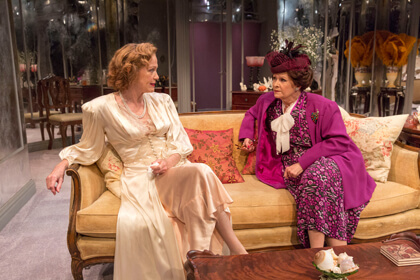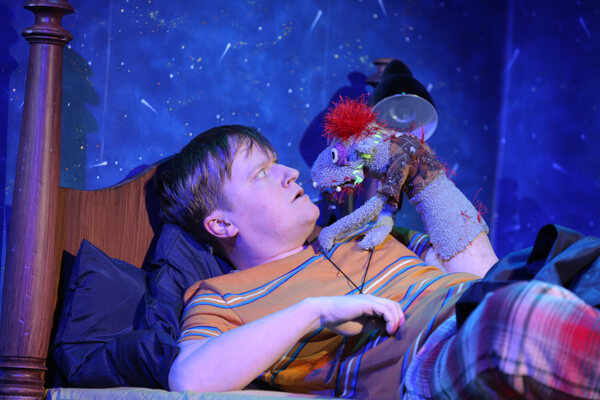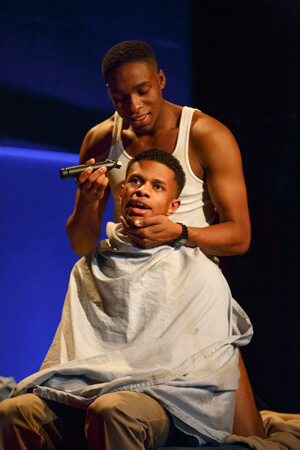“Moscow Moscow Moscow Moscow Moscow Moscow” is, simply, delicious. Halley Feiffer’s play is a contemporary adaptation of “Three Sisters,” Chekhov’s classic drama of poor choices and impossible love amidst the rigid social structure of a remote provincial Russian town. Feiffer cuts through the Chekhovian language and languor to create a sprightly piece while retaining the original’s emotional underpinnings. Purists may cavil, but this interpretation underscores the fact that Chekhov himself referred to his plays as comedies.
The three sisters — Olga, Masha and Irina — are stuck in their home in the country. They dream of returning to Moscow where they once lived a more exciting life. Their brother Andrey, though, has gambled away the family fortune, and his social climbing wife Natasha is making life miserable for the sisters. Masha, given to dramatics, longs for Vershinin, while trapped in a bad marriage with Kulygin, who is besotted with her. Olga has given up on love and is a teacher in a local school, and Irina, the youngest and most idealistic, is being courted by Tuzenbach, a rather unpleasant but adequately situated soldier.
Using some of Chekhov’s language, Feiffer added lots of contemporary idioms as well, illuminating the story for a moderate audience and cutting the play to a swift 95 minutes. Were it not for Trip Cullman’s sharp direction and the wonderful company, this might feel like an intellectual exercise. Instead, the piece has freshness, excitement, and scope that manages, too, to be an homage to the original.
The company is a dream. Rebecca Henderson is a stunning Olga, her bitterness masked by biting comedy. Tavi Gevinson is gamine and innocent as Irina, only later learning to accept life’s disappointments. Chris Perfetti is Masha, and his sense of drama at the smallest moment is one of the production’s highlights. At the same time, he embodies the Masha’s restlessness and dissatisfaction with life. As Natasha, the only character who gets what she wants, Sas Goldberg brilliantly — and vehemently — takes over the house. Alfredo Narciso as Vershinin, Steven Boyer as Tuzenback, and Greg Hildreth as Andrey are all excellent.
Mark Wendland’s simplistic platform set is dominated by a large, illuminated sign that says “Moscow” in Russian with a cityscape painting underneath. Ben Stanton’s lighting is both atmospheric and harsh, as required, and Paloma Young’s costumes are simple, move well, and convey all we need to know about the characters, particularly Masha’s romantic black dress which has seen better days.
Anyone who “Three Sisters” is keenly aware that the obsession for going to Moscow as a means of escape from torturous lives is a recurring theme. One of the biggest laughs of the play comes when the sisters look at each other after a bout of complaining about their lives and say, “Or, we could just leave.” Yes, it’s snarky, flippant, and as Natasha says, “obvi,” but it is also a perfect cap for Feiffer’s deconstruction of “Three Sisters” — and resonates well beyond the gag, prompting consideration of the big divide between Chekhov’s world and our own.
Luis Alfaro’s new play “Mojada,” now at the Public, recasts Euripides’ “Medea” as an undocumented immigrant laying low in Corona, Queens. “Mojada” is a derogatory term for Mexicans, and Medea and her companion Jason are struggling to make a new life for themselves after a harrowing journey to New York.
Medea — afraid to go out and so, at the mercy of people who take advantage of her skills as a seamstress and pay her far less than what she’s worth — only wants a better life for her son. Jason, on the other hand, is full of get-ahead energy and decides to marry Pilar, an immigrant who has become a citizen and built a thriving business. That Jason never married Medea (a change from the original) before coming to New York with her is essential to the plot but one of the few elements that seem forced in the classic tale’s reimagining. Medea is trapped, outraged, and on her own. She exacts revenge on Jason by poisoning Pilar and then murdering her own son, Acan.
Where Euripides’ original is huge and dramatic, Alfaro’s piece is much smaller and contained to the grim backyard of the house where Medea and Jason live hidden and at the mercy of Pilar. (Arnulfo Maldonado did the excellent, evocative set.) The piece gets its emotional heft from portraying the cost for Medea of leaving Mexico, her hope of a new life giving way to hopelessness as she realizes she has nowhere to go and no one to help her. In the current political climate, “Mojada” is poignant and heartbreaking. While extreme and theatrical, we understand that Medea’s fatal actions are not based in evil but rather desperation.
Savina Zúñinga Varela plays Medea with both simplicity and depth. Her performance becomes increasing electric as the character is forced into her final act of violence. Alex Hernandez as Jason is an excellent counterpoint to her, exuding excitement at his potential success, even as it distances him from Medea and blinds him to her suffering. Ada Maris is very strong in an unsympathetic role as Pilar. Socorro Santiago is charming and funny as Tita, Medea’s servant who has made the journey with them as much out of love and devotion as a need to escape. Vanessa Aspillaga plays Luisa — a woman who exemplifies the world Medea is afraid to go out into and prefers to be called by the hipster name Lulu — with verve. For all her brashness, however, Luisa abandons Medea in her moment of need, saying that in this world it’s every man and woman for themselves. It is that realization that makes “Mojada” so tragic.
Homage is a tricky business. It can illuminate and amplify something that’s familiar or, when facile or insensitive, be discomfiting. Unfortunately, “Broadway Bounty Hunter,” the new musical from tune spinner Joe Iconis along with Lance Rubin and Jason Sweettooth Williams, falls into the latter category. Ostensibly inspired by the “Blaxsploitation” movies of the 1970s, it ends up being demeaning and racist. It’s ageist and sexist, as well.
The black films of the 1970s, from “Shaft” to “Foxy Brown” and countless others, created starring opportunities for African-American actors and, despite the over-the-top storylines, offered their characters control, agency, and independence from the white characters who dominated Hollywood movies. Dispelling stereotypes of the roles blacks could play, these films were considered empowering. “Broadway Bounty Hunter,” however, reduces its black lead to a stereotype in the form of a Shaft-like agent named Lazarus, subordinate to a white character, a superficial tool. Shaft has become Stepin Fetchit, and that’s offensive.
Annie Golden, of “Assassins,” “The Fully Mounty,” and “Orange is the New Black,” plays Annie Golden, an actress of a certain age who can’t get work. No actress who isn’t delusional would try to be cast using a 30-year-old headshot. That the character Annie does, then, is merely a pretext for some nasty age-related and sexist jokes. Debased and dejected, Annie is recruited to be a bounty hunter by people who show up in her apartment one night. She’s trained and sent off to Ecuador with Lazarus to capture the notorious gangster Mac Roundtree, who is not the person we think he is.
The plotting soon becomes convoluted and ludicrous. There are meth-like drugs that are supposed to make it possible for actors to do 15 performances a week, rather than eight. There is a dojo where Annie trains and creates a signature move. There are sex workers exhorted to unionize, and it just goes on.
The score is Iconis’ typical, generic rock and roll. The songs are catchy but slight — yet performed at uncomfortable amplification in the small Greenwich House Theater. Jennifer Werner’s direction is largely leaden, and her choreography lacks a coherent vision. The one redeeming element of this show is the talented company. Golden is in great voice, and she has an idiosyncratic mien that’s charming. Alan H. Green as Lazarus is quite good with what he’s been given to do, and the rest of the ensemble is talented and energetic.
I don’t believe that the show’s creators intended to make a show that is the antithesis of the form they intended to honor. Still, in its tone-deafness and failure to understand the current cultural climate, never mind the original material, that’s the effect.
MOSCOW MOSCOW MOSCOW MOSCOW MOSCOW MOSCOW | MCC Theater, 511 W. 52nd St. | Through Aug. 17: Tue.-Sat. at 7:30 p.m.; Wed., Sat. at 2:30 p.m. | $64-$84 at mcc.theater.org or 646-506-9393 | One hr., 35 mins., with no intermission
MOJADA | The Public Theater, 475 Lafayette St., btwn. E. Fourth St. & Astor Pl. | Through Aug. 18: Tue.-Sun. at 8 p.m.; Sat.-Sun. at 2 p.m. | $60 at publictheater.org or 212-966-7555 | One hr., 45 mins., with no intermission
BROADWAY BOUNTY HUNTER | Greenwich House Theater, 27 Barrow St., btwn. Seventh Av. S. & W. Fourth St. | Through Sep. 15: Tue.-Thu. at 7:00p.m.; Fri.-Sat. at 8 p.m.; Sun. at 7:30 p.m.; Sat.-Sun. at 2 p.m. | $49-$129 at ovationtix.com or 866-811-4111 | Two hrs., five mins., with intermission


